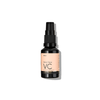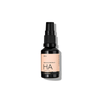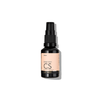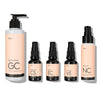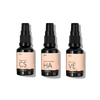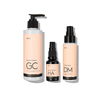Healing Touch: Restoring and Caring for a Damaged Skin Barrier
Our skin is the body's largest organ and serves as the first line of defence against environmental aggressors. It's a dynamic barrier that protects us from harmful elements while maintaining hydration and resilience. However, this protective layer can become compromised, leading to a host of skin issues. In this blog post, we'll explore the importance of a healthy skin barrier, the signs of a damaged skin barrier, and the steps you can take to restore and care for it.
What is the Skin Barrier?
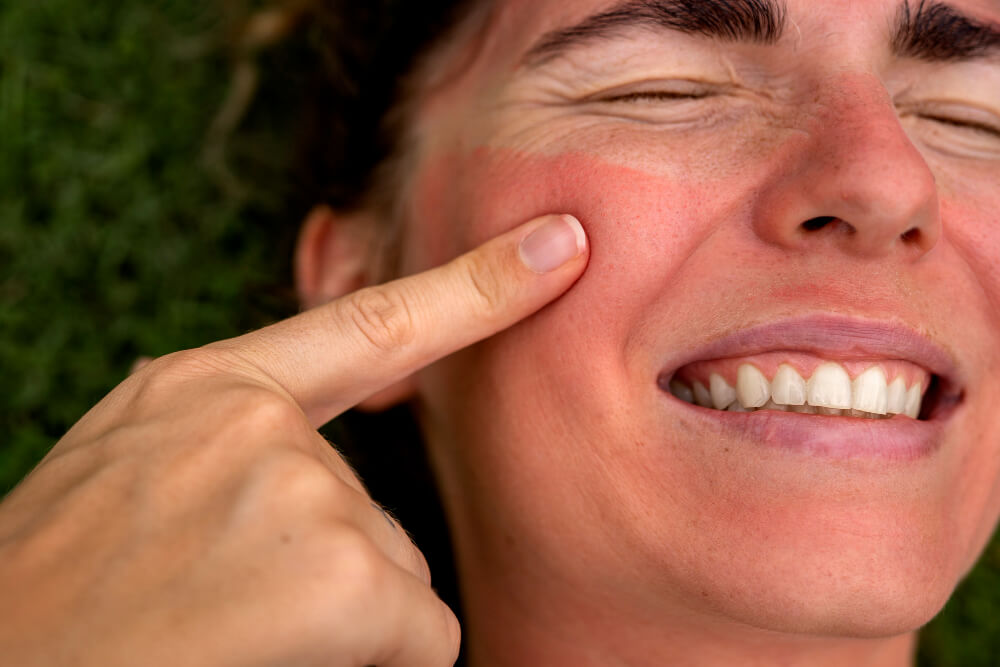
The skin barrier is the outermost layer of your skin, known as the stratum corneum. It consists of dead skin cells (corneocytes) held together by a lipid matrix composed of ceramides, cholesterol, and fatty acids. This structure forms a protective shield that prevents water loss and shields the skin from external irritants and pathogens.A healthy skin barrier is crucial for maintaining skin hydration and preventing the entry of harmful substances.
The Role of the Skin Barrier
The skin barrier is composed of dead skin cells (corneocytes) held together by a lipid matrix. This structure plays a vital role in:
- Preventing transepidermal water loss (TEWL)
- Protecting against external aggressors
- Maintaining skin's overall health and appearance
Signs of a Damaged Skin Barrier
When the skin barrier is compromised, it can manifest in various ways, including:
- Dryness and Flakiness: A compromised barrier can't retain moisture, leading to dehydrated skin.
- Redness and Inflammation: Damage can trigger an inflammatory response, causing the skin to appear red and irritated.
- Sensitivity: When the barrier is weakened, the skin becomes more susceptible to external irritants, leading to increased sensitivity.
- Rough Texture: A disrupted barrier can result in a rough, uneven skin texture.
- Acne and Breakouts: An impaired barrier can lead to an overgrowth of harmful bacteria, contributing to acne and other skin issues.
Causes of a Damaged Skin Barrier
Several factors can contribute to the weakening of the skin barrier:
- Over-cleansing or over-exfoliating: Using harsh cleansers or exfoliating too frequently can strip the skin of its natural oils.
- Environmental stressors: Exposure to UV rays, pollution, and extreme weather conditions can damage the skin barrier.
- Inappropriate skincare products: Using products that are not suitable for your skin type can disrupt the skin's natural balance.
- Lifestyle factors: Poor diet, stress, and lack of sleep can negatively impact the skin's health.
Restoring a Damaged Skin Barrier

Gentle Cleansing
Over-cleansing or using harsh cleansers can strip the skin of its natural oils, exacerbating barrier damage. Opt for gentle, pH-balanced cleansers that remove impurities without disturbing the skin's natural balance.
Hydration and Moisturisation
Use a moisturiser that contains ceramides, cholesterol, and fatty acids, which are essential components of the skin's natural barrier. Hyaluronic acid and glycerin are also excellent ingredients for retaining moisture.
Incorporate Healing Ingredients
Look for skincare products with ingredients that support barrier repair, such as:
- Niacinamide: Helps improve the skin's barrier function and reduces inflammation.
- Centella Asiatica: Known for its healing properties, it soothes and repairs damaged skin.
- Panthenol (Pro-Vitamin B5): Provides deep hydration and aids in skin repair.
Sun Protection
UV radiation can further damage the skin barrier. Use a broad-spectrum sunscreen with an SPF of 30 or higher to protect your skin from sun damage.
Avoid Harsh Treatments
Steer clear of aggressive skincare treatments like chemical peels or high-concentration retinoids until your skin barrier has fully recovered.
Caring for Your Skin Barrier
Maintain a Balanced Skincare Routine
Stick to a simple and consistent skincare routine that focuses on strengthening and protecting the skin barrier. While exfoliation is important for removing dead skin cells, overdoing it can harm the barrier. Limit exfoliation to once or twice a week and use gentle exfoliants.
Use Lukewarm Water
Hot water can strip the skin of its natural oils. Wash your face with lukewarm water to avoid further barrier disruption.
Be Mindful of Product Ingredients
Choose products with gentle, nourishing ingredients and avoid those with irritants like alcohol, fragrances, and essential oils. Incorporate antioxidants like vitamin C and E can help protect the skin barrier from environmental damage by neutralising free radicals.
Pay Attention to Your Diet
A balanced diet rich in antioxidants, healthy fats, and vitamins can support skin health from the inside out.
Manage Stress
Chronic stress can exacerbate skin issues. Incorporate stress-reducing activities such as meditation, yoga, or regular exercise into your routine.
Stay Hydrated
Adequate hydration is key to maintaining a healthy skin barrier. Drink plenty of water and consider using a humidifier to maintain optimal humidity levels indoors.
Conclusion
A damaged skin barrier can lead to a host of skin issues while a healthy skin barrier is the cornerstone of radiant, resilient skin. By recognising the signs of damage and implementing a targeted skincare routine, you can restore and maintain the integrity of your skin barrier.
Remember to be gentle with your skincare routine, choose products with barrier-repairing ingredients, and maintain a healthy lifestyle to support your skin's natural defences. Fether believes in the power of nurturing touch and the profound impact it can have on skin health, guiding you towards a restored and resilient skin barrier.
If you're experiencing persistent skin issues or are unsure about your skincare routine, it's always best to consult with a dermatologist or skincare professional. They can provide personalised advice and recommendations tailored to your specific skin needs.
